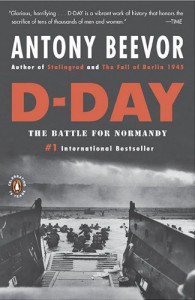A fantastic history of the Normandy campaign

To say that there is no shortage of histories of the Allied invasion of Normandy in June 1944 is something of an understatement, as between the memoirs, the unit histories, and the general accounts of the assault D-Day ranks as among the most chronicled events of the Second World War. Over the years authors from Chester Wilmot and Cornelius Ryan to John Keegan and Carlo D'Este have written highly regarded books describing the events surrounding the landings and their role in ending the war. Because of this, any new account of the invasion should be judged not just on its merits, but on the additional question of what it adds to our already considerable collection of works on the campaign.
What Antony Beevor brings to his own contribution to the genre is threefold. The first is his previous work as a chronicler of the war, particularly in terms of his histories of the Eastern Front, which provide a depth and perspective not always present in other books. The second is Beevor's own background as an army officer, which provides a perspective absent from many of the works by other historians. The third and richest addition, though, is his incorporation of the French civilians into the overall history of the campaign, whose experiences have all too often been marginalized. As a result, readers have an account in which are not virtually absent or merely passive observers but full participants in the Normandy campaign. Appreciating the value of their experiences provides an added depth of understanding to what took place in the summer of 1944.
The result is an account of the invasion and subsequent battles that chronicles events with both nuance and discernment. Beevor takes into consideration the range of factors that drove events, from the issues of weather and logistics to the problems often posed by politics. These come together with the events on the battlefield to form what are often pointed judgments. His conclusions are clearly drawn: while critical of commanders on both sides of their capabilities and their decisions, his opprobrium towards Bernard Montgomery is particularly evident and is supported throughout by highly pointed arguments. Beevor also makes it clear why so many Allied commanders were frustrated with Charles de Gaulle and his sometimes divergent goals, though he also conveys as well the legitimacy of de Gaulle's concerns about the possible shape of a liberated France. But it is his success in capturing the experience of the campaign on all sides that is the greatest strength of his book, as he provides his readers with a real sense of the travails on all sides of what proved to be an epic battle of the war.
It is these qualities which makes Beevor's book such a fantastic history of the Normandy campaign. While it is not the last word on the campaign, it is a superb starting point for anyone seeking to read about one of the defining battles of the war in Europe — one that captures well both its importance to the war and the experience of the people who lived through it.






